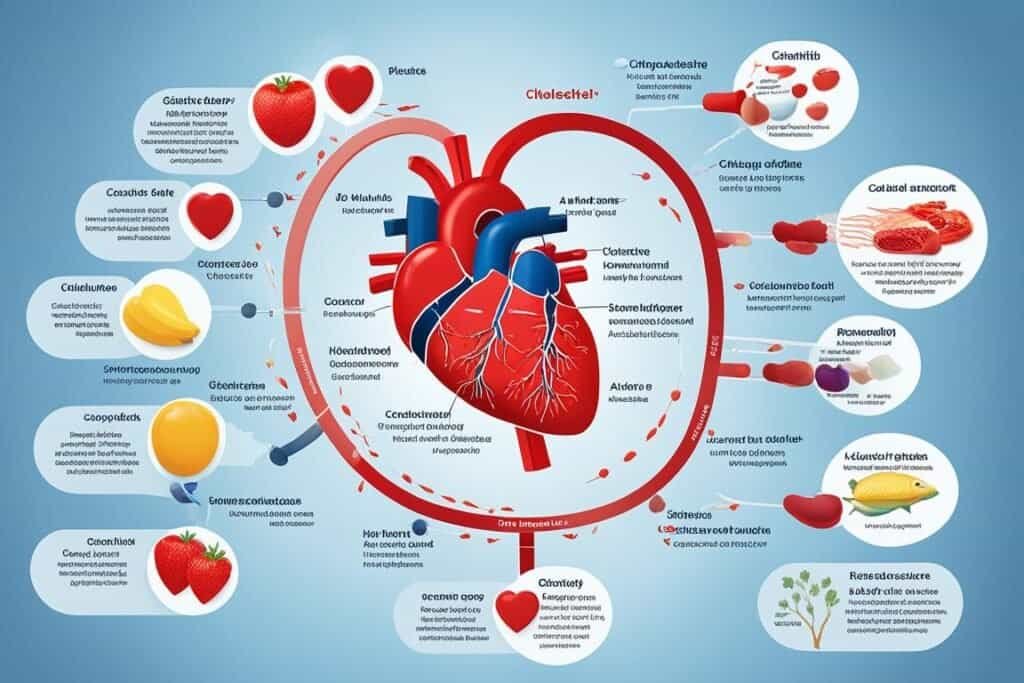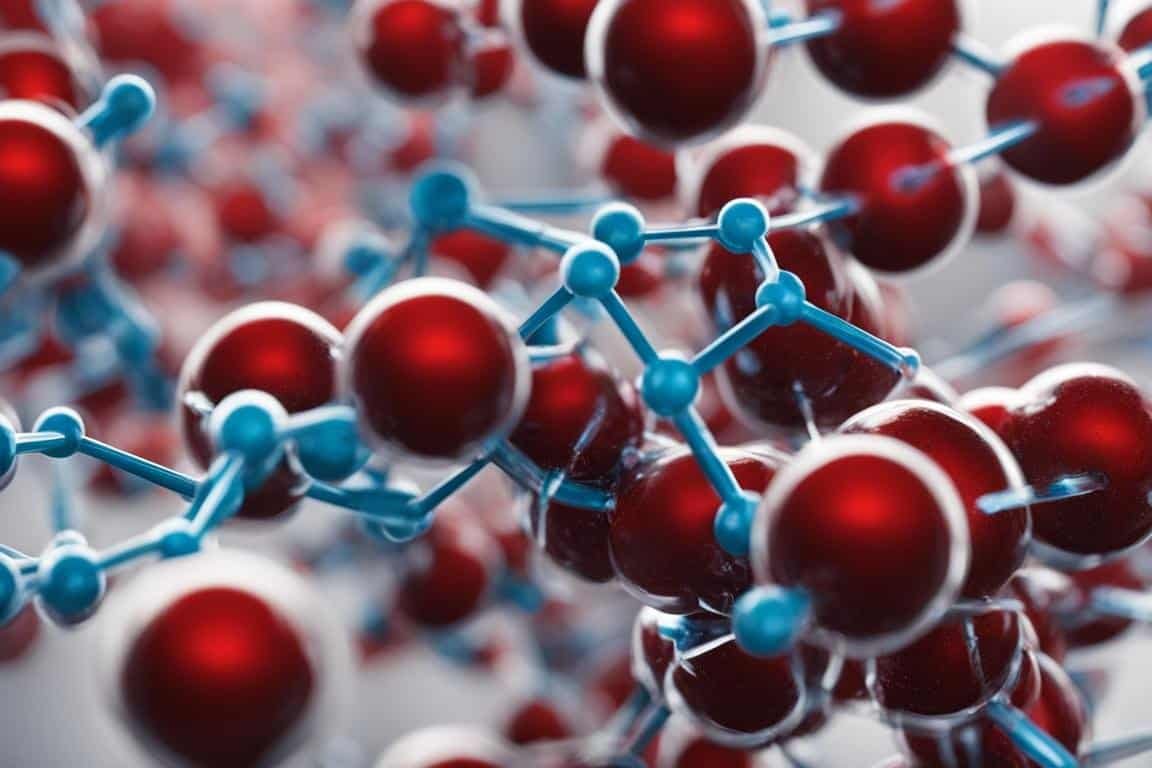Cholesterol and steroids – are they the same thing? Many people often confuse cholesterol with steroids, assuming that they are one and the same. However, it’s important to understand that cholesterol and steroids are distinct substances with different roles in the body.
Cholesterol, a waxy and fat-like substance, is naturally produced by our bodies. It plays a vital role in hormone production and cell function. On the other hand, steroids are a class of hormones that include testosterone and cortisol. While cholesterol serves as a precursor for the production of some steroid hormones, it is not a steroid itself.
To gain a clearer understanding of the connection between cholesterol and steroids, let’s delve deeper into their roles and impact on our health.
Key Takeaways:
- Cholesterol is a distinct substance from steroids.
- Cholesterol plays a crucial role in hormone production and cell function.
- Steroids are a class of hormones that include testosterone and cortisol.
- While cholesterol is a precursor for some steroid hormones, it is not a steroid itself.
- Understanding the differences between cholesterol and steroids is important for maintaining optimal health.
The Role of Cholesterol in Steroid Hormone Production
Cholesterol plays a vital role in the synthesis of steroid hormones in your body. It serves as the building block for these hormones, including testosterone, estrogen, and progesterone, which are essential for various bodily functions.
Testosterone is a key hormone in both men and women, influencing muscle development, bone density, and sexual characteristics. Estrogen is primarily associated with female reproductive health, but it also affects bone health and cardiovascular function in both genders. Progesterone plays a crucial role in regulating the menstrual cycle and supporting pregnancy.
Without cholesterol, your body would not be able to produce an adequate amount of these important hormones. Cholesterol acts as the precursor molecule, converting into the specific steroid hormones through a series of chemical reactions.
This image visually represents the connection between cholesterol and the production of steroid hormones. As you can see, cholesterol serves as the foundation, leading to the synthesis of testosterone, estrogen, and progesterone.
The Impact of Cholesterol on Health
While cholesterol is necessary for the production of steroid hormones, it’s important to maintain healthy cholesterol levels to prevent detrimental effects on your health. High cholesterol levels, especially elevated levels of LDL (“bad”) cholesterol, are associated with an increased risk of heart disease and other cardiovascular conditions.
To ensure your cholesterol levels are within a healthy range, it is recommended that you:
- Follow a balanced diet: Incorporate foods that are low in saturated and trans fats while including sources of healthy fats like avocados, nuts, and fatty fish.
- Engage in regular exercise: Get at least 150 minutes of moderate-intensity aerobic activity or 75 minutes of vigorous-intensity aerobic activity per week.
- Consider medication: If necessary, your healthcare provider may prescribe medication, such as statins, to help manage your cholesterol levels effectively.
Managing your cholesterol levels is essential for maintaining optimal health and reducing the risk of heart disease. By adopting a healthy lifestyle and working closely with your healthcare provider, you can keep your cholesterol in check and promote overall well-being.
The Connection Between Cholesterol and Anabolic Steroids
While cholesterol plays a vital role in the body’s production of steroid hormones, it should not be confused with anabolic steroids. Anabolic steroids are synthetic variations of testosterone, a naturally occurring steroid hormone. These substances are often used illegally to enhance athletic performance and muscle growth.
It’s important to note that abuse of anabolic steroids can have severe health consequences, including increased cardiovascular risk, liver damage, hormonal imbalances, and psychological effects. Encouragingly, proper cholesterol management through lifestyle changes and medical guidance can mitigate some of the harmful effects associated with anabolic steroid use.
The Impact of Cholesterol on Corticosteroids
Corticosteroids are a class of medications that mimic the effects of cortisol, a naturally occurring steroid hormone. Unlike anabolic steroids, corticosteroids are commonly prescribed by healthcare professionals to reduce inflammation, suppress the immune system, and manage various medical conditions.
When taking corticosteroids, it’s essential to be aware of their potential impact on cholesterol levels. Prolonged use of corticosteroids, especially at higher doses, can elevate LDL cholesterol levels and decrease HDL (“good”) cholesterol, increasing the risk of cardiovascular complications over time.
If you require corticosteroid treatment, your healthcare provider will monitor your cholesterol levels and recommend appropriate measures to manage and mitigate the potential adverse effects.

Managing Cholesterol Levels
| Actions to Take | Benefits |
|---|---|
| Follow a balanced diet | Reduces LDL cholesterol levels and promotes overall cardiovascular health |
| Engage in regular exercise | Increases HDL cholesterol levels, improves heart health, and aids weight management |
| Consider medication under medical guidance | Effectively lowers LDL cholesterol levels and reduces the risk of heart disease |
Factors Affecting Cholesterol Levels
Cholesterol levels in your body can be influenced by various factors. It’s important to understand how these factors can impact your cholesterol levels and take steps to manage them for optimal health.
- Chronic Stress: Prolonged exposure to chronic stress can lead to an increase in cholesterol production by the liver. This can result in higher cholesterol levels in your body. It is essential to find healthy ways to manage stress, such as regular exercise, meditation, or seeking support from loved ones.
- Medications: Some medications, such as corticosteroids and certain birth control pills, can affect your cholesterol levels. Corticosteroids are commonly used to treat conditions like asthma and autoimmune disorders, but they can increase LDL (“bad”) cholesterol levels and decrease HDL (“good”) cholesterol levels. If you are taking any medications that may impact your cholesterol, it is advisable to discuss this with your healthcare provider.
- Thyroid Dysfunction: The thyroid gland plays a crucial role in regulating your metabolism, including cholesterol metabolism. Both an underactive thyroid (hypothyroidism) and an overactive thyroid (hyperthyroidism) can disrupt cholesterol levels. If you have a thyroid disorder, it is important to work closely with your healthcare provider to manage your cholesterol levels effectively.
- Diet and Exercise: Your lifestyle choices, such as your diet and exercise habits, can significantly influence your cholesterol levels. Consuming a diet high in saturated and trans fats can raise LDL cholesterol levels, while a diet rich in fruits, vegetables, whole grains, and healthy fats can help lower cholesterol. Regular physical activity can also have a positive impact on cholesterol levels. It is recommended to aim for at least 150 minutes of moderate-intensity aerobic exercise per week.
- Coffee: While coffee in moderation is generally safe and may even have some health benefits, certain compounds found in coffee, such as cafestol and kahweol, can raise cholesterol levels. If you have high cholesterol, it may be advisable to moderate your coffee consumption or opt for filtered coffee which removes these compounds.
By being aware of these factors and making positive lifestyle choices, you can take control of your cholesterol levels and reduce the risk of cardiovascular diseases associated with high cholesterol. Consult with your healthcare provider for personalized advice and guidance.
The Link Between Cholesterol and Kidney Function
High cholesterol levels have a significant impact on kidney function and the risk of kidney disease. When cholesterol levels are elevated, they can harm the kidneys by creating deposits in the blood vessels, reducing blood flow, and causing inflammation. On the other hand, kidney problems themselves can lead to an increase in cholesterol levels. It’s a complex interplay between cholesterol and kidney function.
Nephrotic syndrome and chronic kidney disease are two conditions that can disrupt cholesterol metabolism. Nephrotic syndrome, characterized by excessive protein leakage in the urine, can cause low levels of high-density lipoprotein (HDL) cholesterol, commonly known as the “good” cholesterol. Chronic kidney disease, which affects the kidneys’ ability to filter waste products from the blood, can raise levels of low-density lipoprotein (LDL) cholesterol, often referred to as the “bad” cholesterol.
Managing cholesterol levels is crucial for protecting kidney health and reducing the risk of kidney disease. A combination of lifestyle changes and medication can be effective in maintaining healthy cholesterol levels. Here are some tips to help you manage your cholesterol and protect your kidneys:
- Eat a balanced diet low in saturated and trans fats. Focus on fresh fruits and vegetables, whole grains, lean proteins, and healthy fats like those found in nuts and avocados.
- Engage in regular physical activity to help maintain a healthy weight and improve cholesterol levels.
- Avoid smoking and limit alcohol consumption as they can negatively affect cholesterol levels and overall kidney function.
- If prescribed by your doctor, take cholesterol-lowering medications, such as statins, as directed to effectively manage your cholesterol levels.
- Keep regular appointments with your healthcare provider to monitor your cholesterol levels and kidney function through blood tests.
By taking proactive steps to manage your cholesterol levels, you can not only protect your kidney health but also reduce the risk of kidney disease. Don’t hesitate to consult your doctor for personalized advice and guidance tailored to your specific needs.
| Cholesterol Levels | Kidney Function |
|---|---|
| High Cholesterol Levels | Can harm kidney function, leading to decreased blood flow and inflammation. |
| Kidney Problems | Can increase cholesterol levels in the body. |
| Nephrotic Syndrome | Causes low levels of HDL cholesterol, the “good” cholesterol. |
| Chronic Kidney Disease | Raises levels of LDL cholesterol, the “bad” cholesterol. |
Statins: The Gold-Standard for Cholesterol Treatment
When it comes to managing high cholesterol, statins have emerged as the gold-standard treatment. These medications are highly effective in lowering LDL cholesterol levels, often referred to as “bad” cholesterol, and reducing the risk of cardiovascular events such as heart attack and stroke.
Extensive research and clinical studies have proven the safety and benefits of statins for the majority of patients. They have become a cornerstone in the management of high cholesterol, helping individuals regain control over their cardiovascular health.
One of the key advantages of statins is their ability to significantly reduce LDL cholesterol levels. By inhibiting an enzyme in the liver responsible for cholesterol production, statins help lower cholesterol levels and prevent the buildup of plaque in the arteries, promoting better blood flow and reducing the risk of cardiovascular diseases.
Furthermore, statins have been found to have additional benefits beyond cholesterol reduction. They have anti-inflammatory effects, improve blood vessel function, and can stabilize plaque in the arteries.
While it’s essential to consult with a healthcare professional for personalized guidance, it’s worth noting that statins are generally well-tolerated and represent a safe treatment option for most individuals. However, like any medication, statins can have potential side effects, although they are typically rare and outweighed by the benefits for most people.
The Benefits of Statins:
- Reduced LDL cholesterol levels
- Lowered risk of heart attack and stroke
- Anti-inflammatory effects
- Improved blood vessel function
- Stabilization of plaque in the arteries
Statin Side Effects:
While the benefits of statins are significant, it’s crucial to address potential side effects. Common side effects may include muscle aches, digestive problems, and mild memory impairment. However, these effects are usually rare and reversible.
Serious side effects such as liver damage and diabetes are extremely uncommon and occur in a very small number of patients. Regular monitoring and routine blood tests are no longer required for most individuals taking statins.
If you experience any unusual symptoms or have concerns about statin therapy, it’s important to discuss them with your healthcare provider. They can provide personalized advice and help guide your cholesterol management journey.
Addressing Concerns About Statin Side Effects
While statins are highly effective in lowering cholesterol levels and reducing the risk of cardiovascular events, some individuals have concerns about potential side effects associated with statin therapy. Common concerns raised include muscle pain and statins, memory loss and statins, the risk of diabetes, and liver damage from statins. Let’s address these concerns to provide a clearer understanding of the risks and benefits.
Muscle Pain and Statins
Muscle pain is a known side effect of statins, but it occurs in only a minority of patients. It is important to note that the majority of cases involve muscle discomfort rather than actual muscle damage. It’s crucial to speak with your healthcare provider if you experience muscle pain while taking statins. They can evaluate your symptoms and determine the best course of action, which may include adjusting your dosage or trying a different statin.
Memory Loss and Statins
Memory loss is an uncommon side effect of statins. Most cases of memory loss associated with statin therapy are temporary and resolve with dosage adjustments or switching to a different statin. If you notice any changes in your memory or cognitive function while taking statins, it is important to discuss them with your healthcare provider. They can assess your symptoms and recommend appropriate strategies to manage them.
Diabetes and Statins
Some studies have suggested that statins may slightly increase the risk of developing diabetes. However, it is important to weigh this potential risk against the significant benefits of statins in high-risk individuals, such as those with cardiovascular disease. If you have concerns about the risk of diabetes associated with statin therapy, your healthcare provider can assess your individual risk factors and help you make an informed decision about statin treatment.
Liver Damage and Statins
Liver damage from statins is extremely rare. Previously, liver function tests were regularly monitored in patients taking statins, but current guidelines no longer require routine monitoring. Serious liver damage associated with statin use is exceptionally rare, and the benefits of statin therapy generally outweigh the potential risks. Nevertheless, it is important to report any symptoms of liver problems, such as yellowing of the skin or dark urine, to your healthcare provider promptly.
| Concerns | Frequency | Management |
|---|---|---|
| Muscle Pain | Minority of patients | Consult with your healthcare provider for evaluation and potential dosage adjustment or switch to a different statin. |
| Memory Loss | Uncommon | Discuss any changes in memory or cognitive function with your healthcare provider for assessment and possible adjustments to statin therapy. |
| Diabetes Risk | Slight increase | Weigh the benefits and risks of statin therapy with your healthcare provider, considering your individual risk factors for cardiovascular disease. |
| Liver Damage | Extremely rare | Report any symptoms of liver problems to your healthcare provider promptly. |

Conclusion
In conclusion, cholesterol, although not a steroid itself, plays a crucial role in the production of steroid hormones in the body. It serves as a building block for hormones like testosterone, estrogen, and progesterone, which are essential for various physiological processes.
However, high cholesterol levels can pose significant health risks, particularly for cardiovascular health. Excess cholesterol, especially LDL cholesterol, can contribute to the development of heart disease and other related conditions.
Fortunately, statins have emerged as the gold-standard treatment for managing high cholesterol. These medications effectively lower LDL cholesterol levels and reduce the risk of cardiovascular events. Despite concerns about side effects, research shows that statins are generally safe and well-tolerated by most individuals.
It is crucial to address any concerns or questions about statins with a healthcare professional. A thorough understanding of cholesterol management can help individuals make informed decisions and take proactive steps in maintaining their cholesterol levels within a healthy range. By staying informed and working closely with healthcare providers, individuals can prioritize their cardiovascular health and overall wellbeing.

